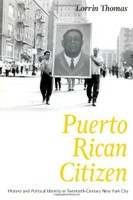New book explores activism and identity of Puerto Ricans in New York City

Consider U.S. Supreme Court Justice Sonia Sotomayor: Her landmark appointment led to countless headlines like “first Hispanic justice,” with few stories dedicated to her Puerto Rican heritage and our nation’s distinct relationship with this population that dates back to 1898, when the U.S. took possession of the island.
Lorrin Thomas studies and teaches the history of the Americas at Rutgers–Camden. Her new book, Puerto Rican Citizen: History and Political Identity in Twentieth-Century New York City (The University of Chicago Press, 2010) addresses the tension of a people trying to figure out what their U.S. citizenship meant and how they struggled to make it work for them. This arrangement also faced serious resistance on the island, forcing hundreds of Puerto Ricans to fight for decades to be citizens of their actual homeland.
“For Puerto Ricans, U.S. citizenship has been the de facto and the only option between 1918 and 1997,” says Thomas, an assistant professor of history at Rutgers–Camden.
A graduate of Columbia College and the University of Pennsylvania, Thomas spent the last decade researching the book at various libraries, including Hunter College’s Center for Puerto Rican Studies, where she examined unpublished memoirs, oral histories, and manuscript papers. She also culled archival material from the New York Volume of the Writer’s Project’s American Guide series, paying particular attention to details on “ethnic neighborhoods.”
“As the research unfolded, I realized that what was really happening over course of early to mid 20th century was
disillusionment about the meaning of citizenship. Many objected to the colonial relationship, but at least some thought ‘when I get to the U.S. I can vote and I won’t be rejected,’ but found patterns of discrimination and felt like second-class citizens,” says Thomas. “Formal legal citizenship wasn’t necessarily going to deliver all of those freedoms.”The Rutgers–Camden researcher connected what political theorists in the mid 1990s described as “the politics of recognition” or what Thomas calls “political participation beyond citizenship” to demands the Puerto Rican community were making on the streets. “Much of what academics said sounded like what so many Puerto Rican activists had been saying: ‘We don’t need citizenship, we need recognition as full members of society.’”
Thomas’ intellectual interest in citizenship developed during her days as an undergraduate at Columbia, when she became intrigued by the ways the founding ideologies of the United States so often conflicted with politics on the ground. At the same time, she became more curious about our nation’s complicated relationship with Latin America.
“When I got to graduate school I realized that I was in charge of my own curriculum and that if I wanted to teach both the history of the United States and the history of Latin America, I could design my program of coursework,” she says.
Now Thomas’ students benefit from her academic pursuits concerning the Americas as they learn about our country’s often troubled past with our southern neighbors.
“A lot of what we don’t know about Latin America is just simple arrogance. We’re the biggest and the best so we don’t really need to worry about other people. That’s one element. But another really important element is that there have been ways that leaders in the U.S. who have been involved in these countries have downplayed our engagements with them because so much of it has been exploitative,” the Rutgers–Camden researcher adds.
Thomas’ next project will address how and when pleas for civil rights in countries around the Americas transitioned into an outcry for human rights.
“Languages of politics used by everyday people is the common thread between these two projects,” says Thomas. “I’m always curious about how people develop and adapt their political goals and ideas.”
Media Contact: Cathy K. Donovan
(856) 225-6627
E-mail: catkarm@camden.rutgers.edu